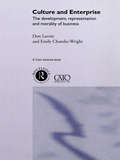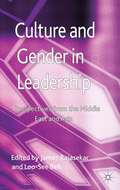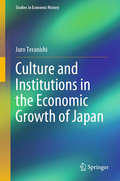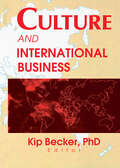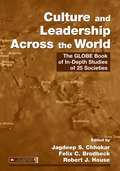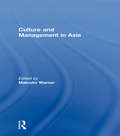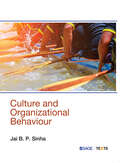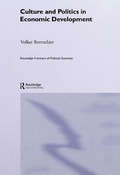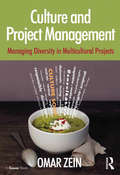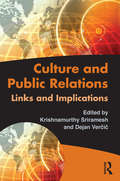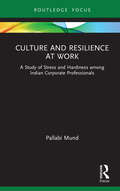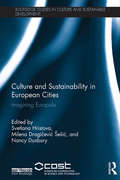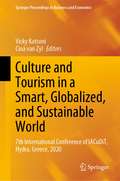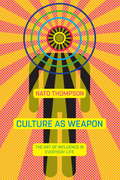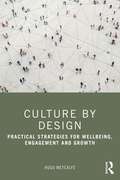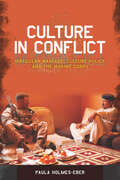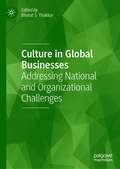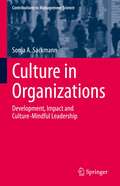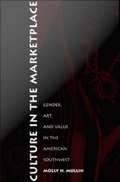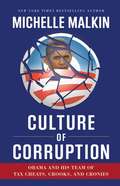- Table View
- List View
Culture and Enterprise: The Development, Representation and Morality of Business (Routledge Studies in the Modern World Economy #No.26)
by Emily Chamlee-Wright The late LavoieWhat is the animating 'spirit' behind what may appear to be the coldly calculating world of markets and business enterprise? Though often mathematically modelled in dry terms, markets can be looked at instead as meaningful domains of human activity. To economists, markets have been seen as nothing but objective 'forces' or allocation 'mechanisms'. This book, however, argues that they can be seen as involving the human spirit, personal expression and moral commitments. It presents the view that markets are not so much things that need to be measured as meanings that need to be narrated and interpreted. The aim of this book is to introduce two scholarly fields to one another, economics and cultural studies, in order to pose the question: how does culture matter to the economy? When we look at the economy as a legitimate domain of culture, it transforms our understanding of the nature of business life. By viewing markets as an integral part of our culture, filled with the drama of human creativity, we might begin to better appreciate their role in the world.
Culture and Gender in Leadership
by James Rajasekar Loo-See BehThe overall aim of this volume is to present the research studies carried out in the Middle East and Asia in the fields of culture and gender and their influence on leadership in particular. The cultures and practices of these geographical regions are very much varied and this book, Culture and Gender in Leadership: Perspectives from the Middle East and Asia, brings together analyses of these themes in selected countries of these two regions. The chapter authors use detailed descriptions, case studies and vignettes to speak to the cultural relativism and gender in leadership in these countries and provide a unique and comparative perspective drawn from their own cultures. This volume also contributes to the development of theory and empirical research found in these regions and through the collective efforts presented in this book, attempts to strengthen the body of knowledge and practice in the fields of culture and gender in leadership. As Asia is becoming the engine of economic growth for the world and Arab Spring is opening up new vistas in the Middle East, this book is a must read.
Culture and Institutions in the Economic Growth of Japan: Towards Diversified Models Of Historical Paths (Studies in Economic History)
by Juro TeranishiThis book gives a coherent explanation of the socio-economic dynamics of Japan from the thirteenth to the twentieth centuries by means of the evolution of internalized culture and the role of culture in the ordering of the market. The author argues that not only institutions but also culture matters in the ordering of the market and economic behavior. In the Occident, institutions have been pivotal in structuring and ordering the market economy and coordinating incentives of economic agents, as is emphasized by Douglas North. The author of this book argues that culture, defined as historically transmitted beliefs and values specific to each nation, may fulfill similar roles by establishing conventions and norms of behavior of individuals. Japan before the Meiji Restoration (1868) seems to be a typical case. The book presents an analysis of the formation of its internalized part of mental model, owing to religious reform in Buddhism in the thirteenth century and the consequent emergence of commerce-based growth driven by a decline in transaction costs in the Tokugawa Era, from the seventeenth through the mid-nineteenth centuries. Institutions had been largely inefficient due to serious cultural conflicts among classes, especially between the samurai and aristocrats. The relative costs of establishing and enforcing institutions were low in the Occident where internalized beliefs were based on the concept of public, by and large common among individuals; by contrast, in Japan, where internalized beliefs were strongly influenced by others nearby, that differed significantly among individuals, the costs were high because of difficulty in sharing mental models. The economic development of the Occident owed largely to the development of industrial technology nurtured under the development of various institutional devices to coordinate activities, whereas the economic growth of Japan during the Tokugawa Era was caused by the decrease in transaction costs in commercial activities owing to the standardization of conduct nurtured through the deliberate development of culture and to the efforts of small producers enhanced by religious motivation. After the Meiji Restoration, Occidental institutions and industrial technology flowed into Japan rapidly, and the Japanese enthusiastically absorbed the Occidental cultural system crystalized in Enlightenment values. At the same time, the struggle of Meiji leaders to establish national integrity and spirit was an attempt to adapt imported Occidental institutions to the traditional internalized culture and to maintain the merits of historical tradition as much as possible. The book argues that it is not easy to implement fusion or substitution of traditional internalized culture with any “advanced” culture of foreign societies.
Culture and International Business
by Kip BeckerManagement strategies to help you profit in the international realm!What is the most effective way to help an expatriate employee learn to function in the host country? How well do we understand the formation and performance of multinational alliances? Should you threaten to sue your Chinese distributor, or is friendliness a better tactic? These questions are among the issues tackled in Culture and International Business, a practical look at a complex topic.Increasingly, corporations and businesses are transnational or multinational in scope and culture in a way that was unimaginable a generation ago. Employees may be assigned to work overseas or deal with customers, suppliers, distributors, or factories across the globe. Even in domestic offices, employees from several different countries may work side by side. If you want your business to prosper in this new global economy, you must understand the effects of cultural differences on business practices or else risk making costly, potentially disastrous errors.Culture and International Business offers practical ideas and tested research on such vital topics of concern as: defining the moral, ethical, and legal implications of multicultural management attracting and retaining key personnel persuading employees in the host country to mentor an expatriate overcoming divisive cultural differences working within the guanxi relationship networks of China creating sustainable development strategies becoming aware of different attitudes toward change, gender, and risk-takingA genuinely multinational effort, the seven chapters of Culture and International Business were written by authors representing five nations on three continents. This important book is designed to help you understand a wide range of issues from several geographic areas that affect everyone doing business in the new global economy.
Culture and Leadership Across the World: The GLOBE Book of In-Depth Studies of 25 Societies (Organization And Management Ser.)
by Felix C. Brodbeck Jagdeep S. Chhokar Robert J. HouseCulture and Leadership Across the World: The GLOBE Book of In-Depth Studies of 25 Societies is the second major publication of GLOBE (Global Leadership and Organizational Behavior Effectiveness), a groundbreaking, large-scale project on international management research featuring contributions from nearly 18,000 middle managers from 1,000 organizat
Culture and Leadership Across the World: The GLOBE Book of In-Depth Studies of 25 Societies (Organization and Management Series)
by Jagdeep S. Chhokar, Felix C. Brodbeck and Robert J. HouseCulture and Leadership Across the World: The GLOBE Book of In-Depth Studies of 25 Societies is the second major publication of GLOBE (Global Leadership and Organizational Behavior Effectiveness), a groundbreaking, large-scale project on international management research featuring contributions from nearly 18,000 middle managers from 1,000 organizat
Culture and Management in Asia
by Malcolm WarnerLocal culture has long been recognised as a critically important factor in shaping management styles in different Asian countries. This book provides a comprehensive overview of culture and management in major East and Southeast Asian economies. Each chapter provides a survey of the country's history, culture and economy, going on to examine management in the country, together with management education and how management is currently changing. The book will provide an invaluable introduction for students of international management, for those studying management within East and Southeast Asia, and for businessmen trading with the region.
Culture and Management in the Americas
by Alfredo BehrensBehrens, an expert and lecturer on cross-cultural management, maintains that American companies and managers have not tapped into Latin American values of teamwork, innovation and creativity since current survey instruments do not "capture cultural traits in a multicultural workforce. " The author advises managers and human resource experts to look to art, literature and culture to identify these differences and uses examples from Argentina, Brazil and other Latin American countries to reinforce his recommended assessment methods. A final section measures the impact of culture on management in terms of leadership, communication, perceptions and incentives. Annotation ©2009 Book News, Inc. , Portland, OR (booknews. com)
Culture and Organizational Behaviour (SAGE Texts)
by Jai B SinhaCulture and Organizational Behaviour is a textbook for management studies that highlights the effect of the confluence of Western and Indian cultural influences. It adheres to the syllabi of the organizational behaviour courses followed in most major universities and management institutes. The book presents basic knowledge of organizational behaviour as developed in the West, adds to these the latest global research findings, and situates them in the Indian cultural perspective. It also highlights the issues that emanate from the interface of the Indian culture and organizational behaviour. Key Features: - Contains updated case studies from Indian organizations - Focuses on current and emerging strategies in organizational structures, leadership, power and politics - Covers topics like balancing work and other responsibilities, power and politics, and conflict and negotiation, which, though extremely crucial to organizational behaviour, have perhaps not got due attention in the existing literature - Presents the relatively unexplored effects of Indian culture on organizational behaviour. Provides a platform where both theoretical and practical issues can be addressed by managers, researchers, students and teachers alike.
Culture and Politics in Economic Development (Routledge Frontiers of Political Economy #Vol. 67)
by Volker BornschierIn this important book, pre-eminent economic sociologist Volker Bornschier analyzes growth and development in the Old and New Worlds - the so-called 'developed' countries. He shows how sociological and political factors have a massive impact on economic change in those countries. The book is a significant contribution to the burgeoning literature on social capital, trust and democracy and will be of interest to those in the fields of economics, sociology, politics and development studies.
Culture and Project Management: Managing Diversity in Multicultural Projects
by Omar ZeinThe cultural diversity within many major projects require those managing them to adapt their project management approach to be in harmony with the preferences and behaviours of stakeholders from these cultures; failure to do so can lead to misunderstandings about the project’s purpose and structure; significant difficulties in implementation and in some cases, to conflict or litigation. Omar Zein's Culture and Project Management explores the cultural impact on projects and their management, providing the reader with an understanding of the main elements of cross-cultural theory within the project context. These include our perception of context, achievement, power and group dynamics; and how we approach ambiguity and time. He then identifies key aspects of project management where cultural sensitivity is essential (for example, planning, risk management, project communication and leadership) and offers a structured plan for developing what he calls 'cultural tuning' within a project environment. The book draws on the author’s research, his professional experience of working on transnational projects and his own background. His review of the different theories alongside examples and stories of their practical application, offers project managers a new and extraordinarily rich perspective into the likely dynamics of their projects. Making appropriate adaptations to standard processes, choosing what, how and through whom you communicate with stakeholders may be signal elements in the success or failure of your projects; Culture and Project Management will show where to start.
Culture and Public Relations: Links And Implications (Routledge Communication Series)
by Dejan Verčič Krishnamurthy SrirameshCulture and Public Relations explores the impact of culture – societal and organizational – through the global lens of public relations. Structuring the volume around three themes -- culture as an environment for public relations; the culture of PR globally; and the impact of PR on culture -- the editors bring together compelling discussions on such questions as how spirituality, religion, and culture have affected public relations, and how public relations culture has been affected by the "corporate cultures" of business enterprises. Additionally, the volume provides studies on the effect of culture on public relations practice in specific countries. With contributors from Europe, Asia, Australia, and North America, this collection offers international perspectives on a topic that is growing increasingly important in public relations study and practice. It is required reading for scholars, researchers, and students in public relations and also has much to offer the business discipline, for those seeking to integrate culture and communication to their practices.
Culture and Resilience at Work: A Study of Stress and Hardiness among Indian Corporate Professionals (Routledge Focus on Business and Management)
by Pallabi MundIn 1979, Suzanne C. Kobasa propounded her theory of "hardiness" where she hypothesized her 3Cs: Commitment, Control, and Challenge, as the basic ingredients of hardiness that make an individual stress resilient. She was one of the early researchers who paid attention to personality features and illustrated that individuals who experience high level of stress without mental and physical illness have a different personality from those who become ill in stressful conditions. In current times, the discourse has enjoyed a sustained scholarly interest but there is hardly any study on the corporate professionals or the Indian context. Since the early 1990s, India has joined the corporate world and has been a fast-developing country. This changed state of affairs provides a broader scope of study on hardy personality in coping with stress in the Indian context. This book examines the efficacy of hardiness on the Indian corporate professionals in the post-globalization scenario. It endeavours to situate Kobasa’s foundational theorisation along with those offered by other scholars in the context of the contemporary life situations with a focus on India. It presents a hypothesis that in the Indian context, culture could be looked upon as yet another basic component of hardiness. Culture and Resilience at Work offers an assessment of the significant contribution of Indian culture as one of the major contributing components in enhancing hardiness in corporate professionals. It will be of interest to researchers, academics, professionals, and students in the fields of stress management, human resource management, social psychology, culture studies, and organizational behaviour.
Culture and Sustainability in European Cities: Imagining Europolis (Routledge Studies in Culture and Sustainable Development)
by Svetlana Hristova Nancy Duxbury Milena Dragićević ŠešićEuropean cities are contributing to the development of a more sustainable urban system that is capable of coping with economic crises, ecological challenges and social disparities in different nation-states and regions throughout Europe. This book reveals in a pluralistic way how European cities are generating new approaches to their sustainable development, and the special contribution of culture to these processes. It addresses both a deficit of attention to small and medium-sized cities in the framework of European sustainable development, and an underestimation of the role of culture, artistic expression and creativity for integrated development of the city as a prerequisite to urban sustainability. On the basis of a broad collection of case studies throughout Europe, representing a variety of regionally specific cultural models of sustainable development, the book investigates how participative culture, community arts, and more generally, creativity of civic imagination are conducive to the goal of a sustainable future of small and medium-sized cities. This is an essential volume for researchers and postgraduate students in urban studies, cultural studies, cultural geography and urban sociology as well as for policymakers and practitioners wanting to understand the specificity of European cities as hubs of innovation, creativity and artistic industriousness.
Culture and Tourism in a Smart, Globalized, and Sustainable World: 7th International Conference of IACuDiT, Hydra, Greece, 2020 (Springer Proceedings in Business and Economics)
by Vicky Katsoni Ciná Van ZylThis book gathers the proceedings of the 7th International Conference, with the theme “Culture and Tourism in a Smart, Globalized and Sustainable World,” held on Hydra Island, Greece, on June 17–19, 2020, published with the support of the International Association of Cultural and Digital Tourism.Highlighting the contributions made by numerous writers to the advancement of tourism research, this book presents a critical academic discourse on sustainable practices in the smart tourism context, improving readers’ understanding of, and stimulating future debates in, this critical area. In addition to the knowledge economy and the concept of smart destinations, the book addresses new modes of tourism management and development, as well as emerging technologies, including location-based services, the Internet of things, smart cities, mobile services, gamification, digital collections and the virtual visitor, social media, social networking, and augmented reality.
Culture as Weapon: The Art of Influence in Everyday Life
by Nato ThompsonOne of the country's leading activist curators explores how corporations and governments have used art and culture to mystify and manipulate us.The production of culture was once the domain of artists, but beginning in the early 1900s, the emerging fields of public relations, advertising and marketing transformed the way the powerful communicate with the rest of us. A century later, the tools are more sophisticated than ever, the onslaught more relentless. In Culture as Weapon, acclaimed curator and critic Nato Thompson reveals how institutions use art and culture to ensure profits and constrain dissent--and shows us that there are alternatives. An eye-opening account of the way advertising, media, and politics work today, Culture as Weapon offers a radically new way of looking at our world.
Culture at Google
by Nien-He Hsieh Sarah Mehta Amy KlopfensteinBeginning in 2017, technology (tech) company Google faced a series of employee-relations issues that threatened its unique culture of innovation and open communication. Issues included protests surrounding Google's contracts with the U.S. government, restrictions of employee speech, mistreatment of contract and temporary workers, allegations of sexual misconduct and gender inequality, and claims of retaliation against labor organizing. While Google employees felt an obligation to dissent against morally questionable practices, embodying the company's informal motto "don't be evil," the company struggled to respond to employees' concerns while preserving its unique culture.
Culture by Design: Practical Strategies for Wellbeing, Engagement and Growth
by Hugo MetcalfeCulture by Design is about shifting focus from solely organisational outcomes and performance, towards organisational culture and wellbeing. It bridges the gap between two key organisational goals: (a) the drive for improving performance, outcomes and staff retention, and (b) strategies to encourage employee wellbeing, motivation and engagement within the workplace. For too long, organisations have focussed on each of these goals individually, with improvements in one area often coming at the expense of the other. This book demonstrates that this does not need to be the case, that what is required is a shift in perspective towards a culture-focussed approach where improved outcomes, performance and engagement are the added bonuses of a happy, connected staff team. You may be familiar with the phrase "Happy bees work harder"; this book demonstrates the fundamental truth in that statement and illustrates that "What is good for the bees is good for the hive".Through practical strategies and real-world examples, this book reveals that the application of evidence-led, self-directed and cost-effective strategies can support any organisation to cultivate the culture they need to encourage the outcomes they want. This book offers a synthesis of theory and practice from organisational and social psychology, neuroscience and systems dynamics, alongside examples of practical tools you can start using today, to offer a roadmap to cultivating a workplace culture that supports the wellbeing and performance of the organisation as a whole.Whether you are an HR director, People Manager, C-Suite Team member or Wellbeing and Culture Lead, this book is relevant to Leaders in organisations of any size. If you are interested in what works when it comes to improving staff wellbeing, how to go about the process of culture change or who makes the tea and why it matters, then this book is for you.
Culture in Conflict: Irregular Warfare, Culture Policy, and the Marine Corps
by Paula Holmes-EberIn response to the irregular warfare challenges facing the U. S. in Iraq and Afghanistan in 2005, General James Mattis#151;then commander of Marine Corps Combat Development Command#151;established a new Marine Corps cultural initiative. The goal was simple: teach Marines to interact successfully with the local population in areas of conflict. The implications, however, were anything but simple: transform an elite military culture founded on the principles of "locate, close with, and destroy the enemy" into a "culturally savvy" Marine Corps. Culture in Conflict: Irregular Warfare, Culture Policy, and the Marine Corps examines the conflicted trajectory of the Marine Corps' efforts to institute a radical culture policy into a military organization that is structured and trained to fight conventional wars. More importantly, however, it is a compelling book about America's shifting military identity in a new world of unconventional warfare.
Culture in Conflict: Irregular Warfare, Culture Policy, and the Marine Corps
by Paula Holmes-EberIn response to the irregular warfare challenges facing the U. S. in Iraq and Afghanistan in 2005, General James Mattis#151;then commander of Marine Corps Combat Development Command#151;established a new Marine Corps cultural initiative. The goal was simple: teach Marines to interact successfully with the local population in areas of conflict. The implications, however, were anything but simple: transform an elite military culture founded on the principles of "locate, close with, and destroy the enemy" into a "culturally savvy" Marine Corps. Culture in Conflict: Irregular Warfare, Culture Policy, and the Marine Corps examines the conflicted trajectory of the Marine Corps' efforts to institute a radical culture policy into a military organization that is structured and trained to fight conventional wars. More importantly, however, it is a compelling book about America's shifting military identity in a new world of unconventional warfare.
Culture in Economics
by Sjoerd Beugelsdijk Robbert MaselandMany economists now accept that informal institutions and culture play a crucial role in economic outcomes. Driven by the work of economists like Nobel laureates Douglass North and Gary Becker, there is an important body of work that invokes cultural and institutional factors to build a more comprehensive and realistic theory of economic behavior. This book provides a comprehensive overview of research in this area, sketching the main premises and challenges faced by the field. The first part introduces and explains the various theoretical approaches to studying culture in economics, going back to Smith and Weber, and addresses the methodological issues that need to be considered when including culture in economics. The second part of the book then provides readers with a series of examples that show how the cultural approach can be used to explain economic phenomena in four different areas: entrepreneurship, trust, international business and comparative corporate governance.
Culture in Global Businesses: Addressing National and Organizational Challenges
by Bharat S. ThakkarThis book offers research geared toward understanding culture and its influence on the success of global businesses. Divided into two parts that look at the leveraging culture cultural diversity from an organizational as well as national perspective, the chapters investigate the effects of technology on culture, the role of leadership in corporate culture, and communicating and managing change across cultures. The book emphasizes that embracing cultural and subcultural differences alongside instilling organizational culture are the keys to successful modern business. With contributions from authors from academic as well as professional backgrounds, this book will serve as a valuable resource to researchers interested in cultural studies generally as well as those studying the importance of culture to managing modern organizations.
Culture in Organizations: Development, Impact and Culture-Mindful Leadership (Contributions to Management Science)
by Sonja A. Sackmann“Culture eats strategy for breakfast”. Peter Drucker’s provocative statement points to the importance of culture for organizations. Depending on its characteristics, culture contributes significantly to the success or failure of for-profit and not-for-profit organizations. Hence, managers and leaders need to have an understanding of this important concept for best results. This book provides relevant knowledge about the concept of culture. This includes its major characteristics and dimensions, the way culture functions and influences both the internal life of an organization and the resulting performance. The book describes the emergence and development of culture over time as well as the formation and influence of subcultures. Even though culture is always present, certain situations call for specific attention such as fast growth or stagnation, strategic alliances, M&As or situations of change. The book describes how to go about understanding and assessing an organization’s culture as a basis for culture change interventions as well as culture-sensitive and culture-mindful management and leadership.
Culture in the Marketplace: Gender, Art, and Value in the American Southwest
by Molly MullinIn the early twentieth century, a group of elite East coast women turned to the American Southwest in search of an alternative to European-derived concepts of culture. In Culture in the Marketplace Molly H. Mullin provides a detailed narrative of the growing influence that this network of women had on the Native American art market--as well as the influence these activities had on them--in order to investigate the social construction of value and the history of American concepts of culture. Drawing on fiction, memoirs, journalistic accounts, and extensive interviews with artists, collectors, and dealers, Mullin shows how anthropological notions of culture were used to valorize Indian art and create a Southwest Indian art market. By turning their attention to Indian affairs and art in Santa Fe, New Mexico, she argues, these women escaped the gender restrictions of their eastern communities and found ways of bridging public and private spheres of influence. Tourism, in turn, became a means of furthering this cultural colonization. Mullin traces the development of aesthetic worth as it was influenced not only by politics and profit but also by gender, class, and regional identities, revealing how notions of "culture" and "authenticity" are fundamentally social ones. She also shows how many of the institutions that the early patrons helped to establish continue to play an important role in the contemporary market for American Indian art. This book will appeal to audiences in cultural anthropology, art history, American studies, women's studies, and cultural history.
Culture of Corruption: Obama and His Team of Tax Cheats, Crooks, and Cronies
by Michelle MalkinIn her shocking new book, Malkin goes where the mainstream media refuse to tread. She digs deep into the records of President Obama's staff, revealing corrupt dealings, questionable pasts, and abuses of power throughout his administration.
